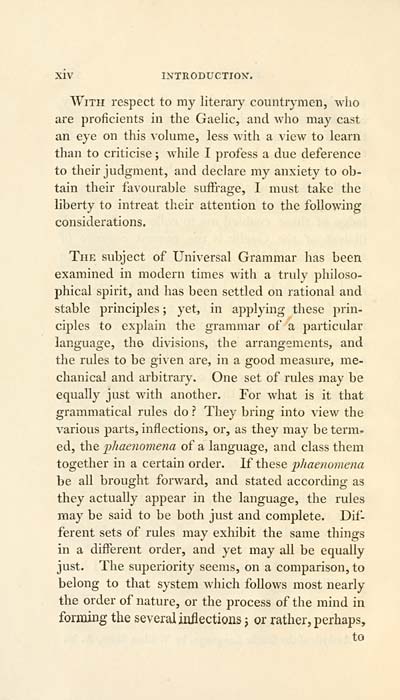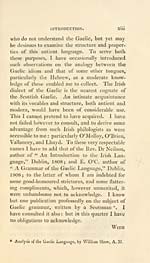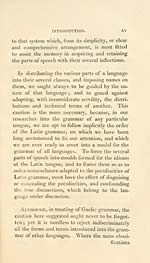Download files
Complete book:
Individual page:
Thumbnail gallery: Grid view | List view

XIV INTRODUCTIOX.
With respect to my literary countrymen, who
are proficients in the Gaelic, and who may cast
an eye on this volume, less with a view to learn
than to criticise ; while I profess a due deference
to their judgment, and declare my anxiety to ob-
tain their favourable suffrage, I must take the
liberty to intreat their attention to the following
considerations.
The subject of Universal Grammar has been
examined in modern times with a truly philoso-
phical spirit, and has been settled on rational and
stable principles ; yet, in applying these prin-
ciples to explain the grammar of a particular
language, the divisions, the arrangements, and
the rules to be given are, in a good measure, me-
chanical and arbitrary. One set of rules may be
equally just with another. For what is it that
grammatical rules do ? They bring into view the
various parts, inflections, or, as they may be term^
ed, the phaenomena of a language, and class them
together in a certain order. If these 2)^tae?io7ne7ia
be all brought forward, and stated according as
they actually appear in the language, the rules
may be said to be both just and complete. Dif-
ferent sets of rules may exhibit the same things
in a different order, and yet may all be equally
just. The superiority seems, on a comparison, to
belong to that system which follows most nearly
the order of nature, or the process of the mind in
forming the several inflections j or rather, perhaps,
to
With respect to my literary countrymen, who
are proficients in the Gaelic, and who may cast
an eye on this volume, less with a view to learn
than to criticise ; while I profess a due deference
to their judgment, and declare my anxiety to ob-
tain their favourable suffrage, I must take the
liberty to intreat their attention to the following
considerations.
The subject of Universal Grammar has been
examined in modern times with a truly philoso-
phical spirit, and has been settled on rational and
stable principles ; yet, in applying these prin-
ciples to explain the grammar of a particular
language, the divisions, the arrangements, and
the rules to be given are, in a good measure, me-
chanical and arbitrary. One set of rules may be
equally just with another. For what is it that
grammatical rules do ? They bring into view the
various parts, inflections, or, as they may be term^
ed, the phaenomena of a language, and class them
together in a certain order. If these 2)^tae?io7ne7ia
be all brought forward, and stated according as
they actually appear in the language, the rules
may be said to be both just and complete. Dif-
ferent sets of rules may exhibit the same things
in a different order, and yet may all be equally
just. The superiority seems, on a comparison, to
belong to that system which follows most nearly
the order of nature, or the process of the mind in
forming the several inflections j or rather, perhaps,
to
Set display mode to: Large image | Transcription
Images and transcriptions on this page, including medium image downloads, may be used under the Creative Commons Attribution 4.0 International Licence unless otherwise stated. ![]()
| Early Gaelic Book Collections > Blair Collection > Elements of Gaelic grammar > (20) |
|---|
| Permanent URL | https://digital.nls.uk/79040215 |
|---|
| Description | A selection of books from a collection of more than 500 titles, mostly on religious and literary topics. Also includes some material dealing with other Celtic languages and societies. Collection created towards the end of the 19th century by Lady Evelyn Stewart Murray. |
|---|
| Description | Selected items from five 'Special and Named Printed Collections'. Includes books in Gaelic and other Celtic languages, works about the Gaels, their languages, literature, culture and history. |
|---|

